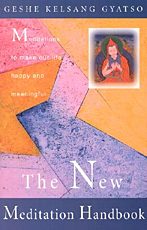Geshe Kelsang Gyatso is a highly respected meditation master and scholar of the Mahayana Buddhist tradition. Originally from Tibet, he came to the West in 1977, and since then has worked tirelessly to teach pure Buddhadharma throughout the world by establishing meditation centers and writing books. He sets the tone of this paperback by emphasizing how peace of mind emerges from meditation practice:
"Meditation is a mind that concentrates on a virtuous object, and which is the main cause of mental peace. The practice of meditation is a method for acquainting our mind with virtue. The more familiar our mind is with virtue, the calmer and more peaceful it becomes. When our mind is peaceful, we are free from worries and mental discomfort, and we experience true happiness. If we train our mind to become more peaceful we shall be happy all the time, even in the most adverse conditions; but if the mind is not peaceful, then even if we have the most pleasant external conditions we shall not be happy. Therefore, it is important to train our mind through meditation."
Gyatso then goes on to present twenty-one meditations designed to help us overcome the deluded states of mind that keep us imprisoned in samsara and enable us to adopt qualities needed to attain full enlightenment. The first six focus on renunciation; the next twelve revolve around cultivating love and compassion for all living beings; the next two deal with overcoming self-grasping; and the last one presents a means to gain deeper experience of the previous twenty meditations. Each meditation instruction has five parts: preparation, contemplation, meditation, dedication, and subsequent practice.
These are very doable and practical meditations, covering such topics as death and impermanence, refuge practice, recognizing that all living beings are our mothers, the disadvantages of self-cherishing and the advantages of cherishing others, wishing love, giving, superior seeing, and more. All together, this manual provides a succinct and inspiring overview of the many ways in which Buddhism can be applies to the situations and activities of daily life.
